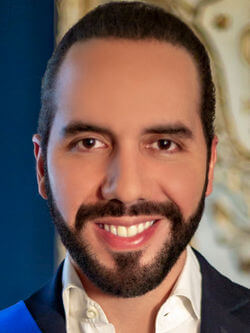
Nayib Armando Bukele Ortez (Spanish pronunciation: [naˈʝiβ buˈkele]; born 24 July 1981) is a Salvadoran politician and businessman who is the 43rd president of El Salvador, serving since 1 June 2019. He is the first Salvadoran president since 1984 who was not elected as a candidate of one of the country's two major political parties: the right-wing Nationalist Republican Alliance (ARENA) and the left-wing Farabundo Martí National Liberation Front (FMLN), of which Bukele was formerly a member.
Beginning in 1999, Bukele worked at an advertising company owned by his father and also established his own advertising company. Both his and his father's companies advertised election campaigns for the FMLN. In 2011, Bukele announced that he would enter politics, and in 2012, he officially became a member of the FMLN. That year, he was elected as the mayor of Nuevo Cuscatlán and served until 2015. That same year, Bukele was elected as the mayor of San Salvador and served until 2018. In 2017, Bukele was ousted from the FMLN, and shortly afterwards, he founded the Nuevas Ideas political party with which he sought to pursue a presidential campaign in 2019. After the Supreme Electoral Court (TSE) refused to register his party, Bukele ran for president with the Grand Alliance for National Unity (GANA) and won with 53 percent of the vote.
In July 2019, Bukele implemented the Territorial Control Plan, an anti-gang program that sought to reduce the country's homicide rate which stood at 38 homicides per 100,000 people in 2019. Homicides decreased by 50 percent during Bukele's first year which he attributed to the Territorial Control Plan. The El Faro digital newspaper and the United States Department of State accused Bukele's government of secretly negotiating with gangs to reduce the homicide rate. After over 80 persons were killed by gangs over the span of one weekend in March 2022, Bukele's government initiated a nationwide crackdown on gangs. This has resulted in the arrests of over 79,000 people with alleged gang affiliations as of 2 April 2024, with over 12,000 of them incarcerated at the Terrorism Confinement Center. The country's homicide rate has decreased to 2.4 homicides per 100,000 as of 2023. In 2021, Bukele passed a law which declared bitcoin as legal tender in El Salvador, and he has promoted plans to build a Bitcoin City powered by geothermal energy to mine bitcoin. In June 2023, the Legislative Assembly approved two of Bukele's proposals to reduce both the number of municipalities from 262 to 44 and the number of seats in the Legislative Assembly from 84 to 60; the reductions will go into effect on 1 May 2024.
Politicians, activists, and journalists have accused Bukele of governing in an authoritarian and autocratic manner. In February 2020 Bukele ordered 40 soldiers into the Legislative Assembly building to intimidate lawmakers to approve a US$109 million loan for the Territorial Control Plan. In May 2021, after Nuevas Ideas won a supermajority in the Legislative Assembly in that year's legislative election, Bukele's allies in the legislature voted to remove the attorney general and all five justices of the Supreme Court of Justice's Constitutional Chamber, replacing them with Bukele's allies. Bukele has attacked journalists and news media outlets on social media and has implemented laws which critics claim censor the press. Bukele ran for re-election in the 2024 presidential election, when the country's constitution was previously interpreted as banning consecutive re-election, and won with over 85 percent of the vote. Before Bukele's presidency, he considered himself to be a member of the "radical left". Since becoming president, he has not identified with any political ideology. During Bukele's presidency, political analysts have described him as a populist and a conservative. Bukele retains high job approval ratings and is highly popular both within El Salvador and across Latin America.
Source : Wikipedia